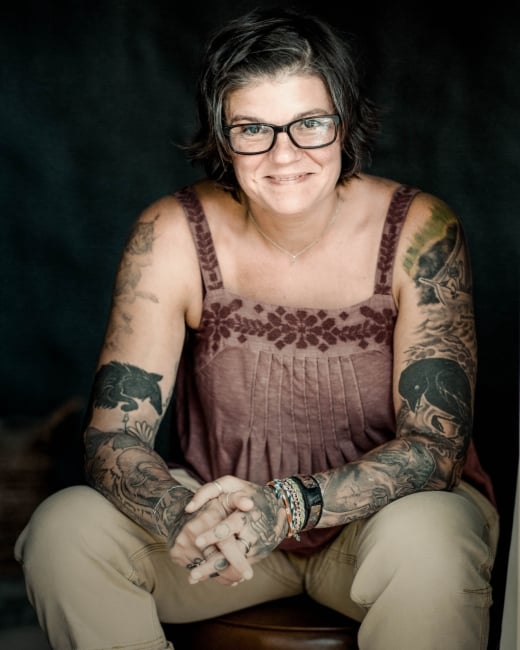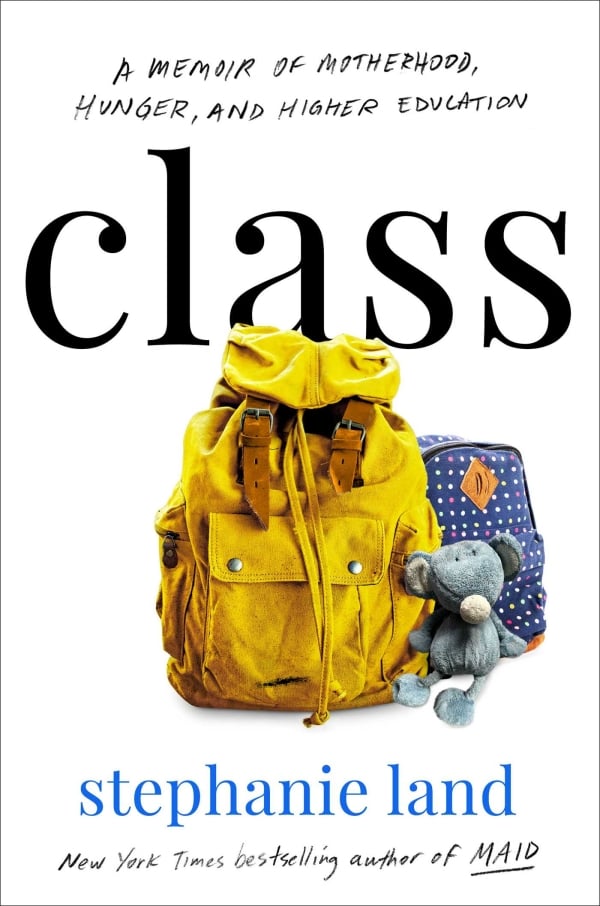You have /5 articles left.
Sign up for a free account or log in.

Stephanie Land, author of the hit 2019 memoir Maid, has a new book, about going to college as a low-income adult and single parent.
Erika Peterman
Stephanie Land was not the typical English major when she enrolled at the University of Montana in 2009.
For one, she was over 30, taking classes largely populated by recent high school graduates. She was also a single mother, raising her daughter in an off-campus apartment that she shared with a rotating cast of younger roommates. She worked a smattering of jobs between classes, cleaning gyms and doing landscaping work for the middle-class academics in town. A decade earlier she had dropped out of the University of Alaska at Fairbanks and fallen into poverty, a period she chronicled in her best-selling 2019 memoir–turned–Netflix series, Maid.
Land, who has endured domestic abuse, lived in homeless shelters and raised a daughter on food stamps, said her five years at the University of Montana were the most difficult of her life. Graduating was also her proudest achievement.

Simon and Schuster
That’s why she felt compelled to write Class, a memoir about embarking on her undergraduate career all over again. She hopes the book helps others in her position feel less alone. And maybe college leaders will take away something valuable, too—though she’s less confident about that.
Land spoke with Inside Higher Ed about campus childcare, the “criminal” student debt crisis and more. Excerpts of the conversation follow, edited for length and clarity.
Q: You followed up on your memoir about cleaning houses and living in poverty while raising a daughter on your own with this book, Class, which is about going to a four-year university—something most people associate with middle-class or wealthier people. Why did you want to tell this story?
A: Well, I was part of a population that’s often forgotten. Or maybe we’re just not seen as very valuable or important; that’s how I felt, anyway. For me, personally, that was the hardest time of my life, and also my biggest accomplishment because of that. Also, as a writer, that year was the time that I felt the most lonely and isolated, so I really needed that story at the time, just to know that there were other people struggling. So it was important to me to write it and hopefully help other people feel less alone.
Q: You write a lot about that feeling of isolation on campus. Can you talk about the experience gap between you and your peers, and the extent to which you think the structure of a four-year campus contributed to your isolation?
A: There’s a very big social aspect to college, of course, and I knew I was missing out on that, but I knew that going into it. What I didn’t know I was missing was relationships with my professors. I talked to a fellow [M.F.A.] classmate, who is a little bit older than me, when I was gathering memories for this book, and he said that he just kind of instinctively knew to go talk to all of his professors during office hours. I didn’t even know that was an option. I felt like I was invading space, robbing professors of resources just by asking for help.
It’s really hard to immerse yourself in this environment that almost everyone around you is telling you you don’t deserve to be in. It really messed with me. So I just tried to be small and not get in anyone’s way. Even just walking through the halls, it was humiliating sometimes. It was like that scene in the movie Juno, where she’s walking and everyone’s staring at her—it felt like that.
Q: Well, and like Juno, you were also heavily pregnant with your second daughter.
A: Yeah, and [I had] a little kid in tow sometimes.
Q: The kind of student you were—part of what the higher ed world calls nontraditional learners, usually shorthand for working-class adults without undergraduate degrees—seems to be a group that institutions are increasingly pivoting toward, especially as the number of recent high school graduates declines with demographic changes. What could institutions do to make students like you feel more welcome?
A: Well, firstly, better and more universal childcare. Having classes during the day was actually helpful for me because I worked odd hours and my daughter was in kindergarten. But for a lot of other people, the day is when they’re working, so it’s not that great. I mean, I’ve been encouraging colleges to look into having intensive classes that meet for four Saturdays or something, or to offer online options. Either way, the school’s childcare only covered the hours when I could prove that I was either at work or physically in class, and didn’t cover travel time.
It was just so itemized, and I felt it was just humiliating, you know? It’s just another appointment where you have to go and tell someone all about your whole entire life and what you’re doing. I had to ask one of my [housecleaning and landscaping] clients to write a letter for me, and it’s just like, why can’t you just offer childcare for everybody and not have this hugely complicated process? Because I ended up spending $500 out of pocket for it anyway.
Q: Do you believe colleges are committed enough to those kinds of changes?
A: Six months after Maid came out, [the University of Montana] invited me to lunch with a potential funder for the [creative writing] program, the director of the English department and the president of the University of Montana [Seth Bodnar]. We were sitting on the school golf course, at their restaurant in front of this nice garden. And the president at one point turned to me and he said, “So how do we get people like you to come to our school?
I said, “What do you mean, people like me? Do you mean poor people?” He said, “Yeah.” So I said, “Why don’t you make it more affordable?” He just kind of waved his arms and said, “Oh, we can’t do that.”
So, I guess, make college useful. I mean, I went to college for an English degree. I don’t know how many people told me that was a useless degree, that I might as well have been going for philosophy, but I’ve obviously used it. The things that I got really frustrated about with college was that in order to get a degree you have to take gym and communications, and I had to take astronomy. I think I took, like, a weather class once, all these math classes—and these things, I have no memory of them and I have never used them, but they cost hundreds of dollars. Those are the things that made me quit [the University of Alaska at Fairbanks]. Why am I going to spend another, like, 500 bucks to take this class called Online Interpersonal Communications? It just felt like a ridiculous game I had to play. And I couldn’t afford to play it. I couldn’t even ante up.
But then I couldn’t get a job. So I said, “OK, I guess I have to do this.” Still, as a poor student, I felt like I should be in a two-year community college program that is for a very specific vocation that would kind of guarantee a “real job.” I really grappled with that feeling. I love community colleges; I think they’re doing excellent work. But all higher education should do that. For a person who wants that four-year degree and the college experience, maybe wants to go and teach in academia, that should be just as accessible.
Q: You studied English and then got your master’s in creative writing, and you write about your anxiety and guilt about pursuing that dream despite your financial situation. How does that stigma affect the dreams working-class people feel they can achieve through higher education?
A: I didn’t really know what higher education could even offer, and I didn’t know what it meant to get a degree in English; I couldn’t make a connection between the four-year college degree and a job, and I don’t think my family or friends really could, either. It was like I was going to school to learn how to paint, and they were like, “OK, why can’t you learn how to paint houses?”
It just gets to be so condescending and patronizing and demoralizing to have people tell you, “This is what a person like you is good for.” That was the kind of conversation I kept having. There was just this overwhelming attitude or feedback that I should not be in this school. Long before I started there, it was just like, “This is not for you. This is for kids with parents who are supporting them, not parents supporting kids.”
Q: Did you eventually make the connection between your English degree and getting a steady job?
A: No, actually. I was not taught how to make money as a writer, in undergrad or in the M.F.A. program. I work as a freelancer, so 80 percent of my job is administrative stuff. Like, it’s not just learning how to write, it’s learning how to get paid to write. But to a lot of creative writing and English academics, that’s too commercial an angle or something.
Q: You introduce a chapter on student debt with a line I found very insightful and darkly funny: “Every single aspect of higher education felt like a cruel game, like I was getting a really advanced degree in irony.” I think this is a relatable sentiment for many lower-class college students. Can you talk about the economic calculations of getting a degree despite being aware of that irony?
A: I think, for a long time, higher education was great at not explaining cost very well. At leaving things vague or making false conflations. Even in the student loan debt crisis conversations now, it’s just like, “Well, it’s like a mortgage.” But it’s not the same. I still don’t understand how a $7,000 loan, by the time I pay it off, will be $17,000. That is the hidden part of that whole thing: they give it to anybody. I had to not think about it. Because if I did, I wouldn’t have gone.
I recently watched The Big Short [the 2015 film based on the Michael Lewis book about the mortgage crisis that led to the Great Recession]. It reminds me a lot of that: “let’s hide all the small print; let’s just push them through and get them approved and not worry about the outcome.” It’s not that people are not smart, or are being frivolous and choosing schools that are way out of their income bracket. It’s that the interest levels, especially on these private loans, are asinine. Almost criminal.
Q: Speaking of The Big Short, a lot of people have predicted that student loans are the next bubble fit to burst. Do you agree?
A: Part of me hopes so. Because—well, the recession was horrible, and I’m not hoping for that. But if you have this massive amount of people who can’t pay back their loans? If it burst, people would finally pay more attention, I would hope. Student loans just feel like a whole other system that’s designed to prevent poor people from applying in the first place. As someone who lived off welfare for many years, I can tell you that government assistance programs are so complicated and ridiculous, and paperwork gets lost, and after a while it’s just too much work. And I feel like college is very much the same.
Q: Is that the message you wanted to impart with Class?
A: The thing I really tried to show in the book was this parallel between how I experienced college and how my daughter experienced kindergarten. I was a low-income student, and she knew that she was the child of a low-income student. Sara Goldrick-Rab [higher education scholar and founder of the Hope Center] talks a lot about two-generation support, where if you’re offering childcare, you’re supporting two generations at once. That was a big part of it, reframing childcare for parent students as not just supporting them but supporting the children, too. (This paragraph has been updated to reflect Goldrick-Rab's resume.)
It’s not just childcare, though. It’s about not treating children like the elephant in the room. Even just to know there were others around would have been a game-changer. Just to talk about it openly and not feel guilty asking for these things I needed.
Q: Will Class be turned into a Netflix series like Maid?
A: As far as I know, no. It was always a limited series. I still have some hope. But in writing Class, I wanted to give people who enjoyed Maid a written season two. I’m hoping some of the fans of that show also enjoy reading this.





